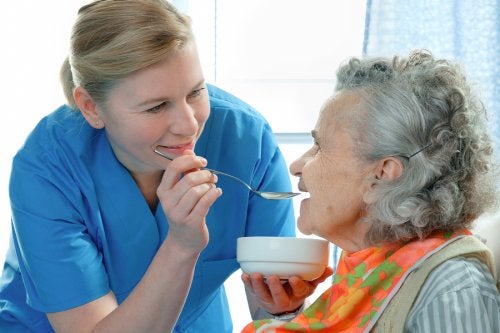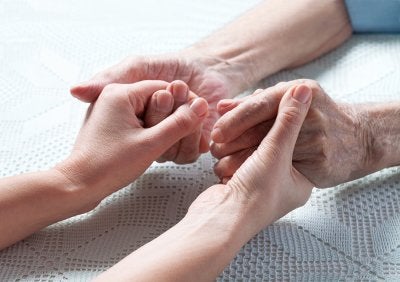-
Sudden Weight Loss in Aging Parents
One of the many benefits of arranging for senior care services in Memphis is that you’ll be kept in the loop about changes in your aging parents’ health . The assisted living provider can prepare nutritious meals for your parents, but he or she can also let you know if your parents seem to have a sudden decline in weight. Sudden weight loss may indicate a serious medical problem. Ask the assisted living provider to take your parents to their doctor for an evaluation.
Some of the possible causes of sudden, unintentional weight loss in seniors include thyroid disorders, liver disease, depression, and cancer. Sometimes, weight loss occurs as a result of adjustments in medication. It can also be associated with Alzheimer’s disease or other forms of dementia. Sudden weight loss can cause muscle wasting and suppressed immune function, which can lead to severe health complications for elderly patients. To reduce this risk, your parents’ doctor may suggest that the caregiver begin preparing high-calorie meals and snacks. online oyun Mostbet

-
Designing an In-Home Care Plan for a Parent with Alzheimer’s
Alzheimer’s disease and other forms of dementia place a considerable burden on families. Elder care at home is usually preferred, but families often lack the time to provide 24/7 care and monitoring. Home health aides in Memphis can bridge the gap between an aging parent’s needs and a family caregiver’s capabilities. If your parent has been diagnosed with Alzheimer’s, it’s time to have a conversation with an assisted living provider.

Identify Needs
Every elderly parent with Alzheimer’s has unique needs, usually depending on the stage of Alzheimer’s they are dealing with. Before designing your parent’s in-home care plan, it’s a good idea to meet with the family doctor to discuss your parent’s specific needs . The doctor may recommend that your parent stop driving if he or she hasn’t stopped already. Other recommendations may include the following:
- Starting new medications
- Making home modifications for fall prevention
- Adding safety devices (e.g., automatic stove turn-offs)
- Wearing a medical alert button
- Receiving assistance with meal preparation and feeding
- Enjoying safe physical exercise
- Engaging in daily cognitive stimulation
Speak with Family Members
Once you have a list of all of your parent’s needs, it’s time to have a talk with other family members about arranging in-home care for your parent. Although an in-home caregiver can provide nearly all of the services your parent may require, most families will still want to be involved with the care plan in some way. Coordinate with other family members who want to provide occasional care. Your sister might take mom or dad for a weekly walk in the park, for instance, while your brother might volunteer to make a couple of meals each week. https://mostbet-games.net/hy/
Ease the Transition
Significant change isn’t easy for many people, particularly aging parents with Alzheimer’s disease. If your parent is a little unsure about the prospect of having a home health aide, it’s best to make the transition gradually if possible. Your parent may want you to be present during the first few visits. As your parent becomes increasingly comfortable with the idea of receiving professional care, the home health aide can take on more tasks without your presence.
-
Understanding What Happens at the End of Life
When a loved one needs hospice care in Memphis because he or she is approaching the end of life, there can be anxiety, particularly among family members, about what to expect. What this video for insight into what may happen at the end of life.
One researcher who has looked extensively into the dying process has found that most people receiving end of life care experience a sense of peace. Family members usually find that being present for end of life care and seeing a loved one pass is a moving experience that brings closeness and closure. Overall, hospice care and the end of life process can be an important time for family members to spend together, and most terminally ill people are peaceful, not fearful, of the process.
-
Requirements of Home Care for the Terminally Ill
When a terminally ill loved one needs care at home, whether he or she needs a caregiver while treatment is ongoing or it is time for hospice care in Memphis , there are unique needs that must be met. It is helpful to choose a caregiver with experience in home care for the terminally ill to ensure your loved one gets the necessary level of care and so you can reduce the pressure on yourself.
First and foremost, a terminally ill loved one may need practical care to assist with basic, everyday needs, such as hygiene and meal preparation. An in-home caregiver can offer this kind of support when you must be at work or when you need respite care. Your terminally ill loved one also needs care that is designed for his or her comfort and dignity. It is common for people to deal with a range of emotions while facing a terminal illness, and your loved one should never feel dismissed or like he or she is a burden to a caregiver. Hiring an experienced caregiver is the best way to make sure that a terminally ill loved one’s needs are being met.

-
Steps to Take When a Loved One Dies at Home
Individuals who are in hospice care are often more comfortable living out the rest of their lives at home. The majority of end of life caretaking in Memphis may be handled by hospice professionals and by an in-home caregiver from a private agency. The primary family caregiver, who is usually the spouse or an adult child, will need to have a checklist of steps to take when the individual passes on.

Locate the DNR
It is likely that your loved one would have a “do not resuscitate” (DNR) order if he or she is in hospice care. You will need to know about this as soon as your loved one enters into hospice care. The DNR is a document that must be issued by a physician. It instructs healthcare providers and/or first responders not to initiate resuscitation efforts in the event that the individual displays cardiac or respiratory arrest. Without a DNR, healthcare providers are required to perform cardiopulmonary resuscitation (CPR). This results in a distressing situation for the surviving family members.
Call Hospice and the Caregiver Agency
After a loved one dies at home , there is usually no need to act immediately. You may wish to sit with your loved one in quiet reflection or you may need to go elsewhere in the home to gather yourself. When you’re ready, call the hospice care team and the private caregiver agency to notify them of the death. They will arrive at your home shortly to assist you and make the official pronouncement.
Contact the Funeral Home
If pre-need arrangements have already been made, you can call the funeral home to notify them. Otherwise, select a local funeral home and make arrangements for the collection of the body. Before the funeral home representatives arrive, the hospice nurse and other caregivers will have already taken certain steps to care for the body and disconnect medical equipment, if necessary.
Make Notifications
If you have close family members nearby, you may wish to notify them before you call the funeral home. They may wish to spend some time with the decedent before he or she is removed. Otherwise, you can make notifications as soon as you feel able to do so. You may not need to make every phone call; notify a core group of close family members and ask that they finish the notifications for you.
-
Identifying Common Post-Operative Challenges
Senior assisted living services are often utilized when a loved one is in declining health, but it’s also a good idea to hire an in-home caregiver in Memphis when a loved one is discharged from the hospital after surgery. This is known as transitional care because the patient is transitioning from hospital care to assisted living care at home. An assisted living provider can help recovering patients with a wide range of post-operative challenges.

Medication Management
After an operation, there may be a number of different medications that a patient might need to take. Typically, post-operative patients take antibiotics and narcotic pain relievers, followed by over-the-counter pain relievers as healing progresses. Some patients might also need to take blood-thinners to reduce the risk of blood clots in addition to their normal medications. It can be a challenge to juggle all of these pills. An in-home caregiver providing transitional care can help patients manage medications by providing medication reminders. This prevents the possibility that a patient might accidentally skip a dose or take an extra dose.
Personal Hygiene
Some surgeries are minimally invasive and may only impose minor limitations on movement. Other operations require a large incision, which can significantly interfere with a patient’s mobility and self-care abilities, particularly if the patient wasn’t in good overall health before the surgery. A transitional care provider may be essential for the patient’s hygiene. Caregivers can assist patients with bathing, dressing, grooming, and toileting, among other routine tasks.
Household Upkeep
For a healthy recovery from surgery, it’s essential to follow the doctor’s post-operative instructions carefully. Usually, these instructions will include limitations on heavy lifting, bending over, and any other strenuous activities. Housekeeping tasks will certainly be out of the question for recovering post-op patients. This is another major benefit of working with a transitional in-home care provider after surgery; all of these tasks can be taken care of by a professional.
Meal Preparation
Balanced nutrition plays a crucial role in the healing process, yet it’s usually difficult for post-operative patients to prepare their own meals. Rather than relying on unhealthy take-out food or premade, frozen meals, patients can enjoy nutritious and delicious homemade meals prepared by an in-home caregiver.
-
Making Your Home Safe for Your Loved One During Stroke Recovery
After surviving a stroke, your family member may require in-home care as she recovers. If you’re planning on acting as a caregiver in Memphis for a recuperating loved one, you may be wondering what you should do to make your home safer.
During your loved one’s stroke recovery, it’s essential to examine your home for any obstacles that may cause her to trip and fall, such as end tables and area rugs. Make rooms and hallways as navigable as possible, leaving little room for injury. Next, consider installing grab bars in your showers and tubs. Combined with non-slip bath mats, these safety features can help prevent dangerous slips.
Additionally, speak with your loved one’s doctor about what changes he suggests, and consult an occupational therapist for recommendations. Finally, consider talking to an assisted living agency regarding the alterations that you should make. These establishments frequently offer transitional and elder care services and are familiar with what home modifications are needed for recovering patients.

-
Finding Out a Spouse is Terminally Ill: What to Do Next
If you have learned that your spouse has a life-threatening disease, you may be wondering what to do next and how to talk about terminally ill caregiving near Memphis . Discovering that your spouse has a terminal illness will mark the beginning of a powerfully emotional process for both of you. Talking about end-of-life care is often difficult to do, but is an essential part of the hospice care process.

Reach Acceptance
After first learning about your spouse’s illness, you may both find yourselves in denial and experience difficulty accepting the situation. Some people react by ignoring the news for a while, and others jump into action, seeking out potential cures and experimental treatments. Procedures and medications can sometimes provide a respite for you and your loved one to enjoy more time together, but your loved one’s condition may become terminal, and their passing will draw nearer. At this point, there are several things you can do to make the time your spouse has left more comfortable.
Share Emotions
You will both be dealing with many feelings and reactions throughout your loved one’s illness. Allow for each of you to speak with each other, family members, medical professionals, and counselors as needed. It’s also important to make time to express your care for your spouse, offer any necessary forgiveness or apology, and to say goodbye.
Discuss Death
Talking about death is difficult for most people, and your loved one may resist this conversation initially. This is also the time to discuss practical matters, such as living wills, do-not-resuscitate orders, and health care power of attorney. Depending on your spouse’s illness, hospice services may be beneficial for both of you. Talk to hospice workers to learn if this type of care is right for your spouse’s situation. Additionally, ask your loved one what they need and want at this stage, and learn how you can make his or her passing as comfortable as possible. LPG masažas ir plaukų šalinimas lazeriu Vilniuje už gerą kainą salone Oblaka
-
How Caregivers Can Ask for Help
Caring for a senior loved one can be a rewarding, but challenging responsibility. If you are caring for an aging loved one, you may benefit from senior assisted living services in Memphis. As a caregiver, it’s vital to be aware of your limits. Caring for a senior family member requires significant time and effort, and can be both physically and emotionally draining. Luckily, there are many places that caregivers can turn to for support.
If you find yourself struggling with an aspect of your caregiving responsibilities, talk to your friends and family members. Also, your church or place of worship, therapists and counselors, and national caregiver associations are valuable resources to turn to for advice.
When you need more time to take care of yourself or your family, it’s important that you don’t hesitate to ask for help. Speak with other family members about how they can contribute, and consider hiring an in-home caregiver for assistance. Other options include respite care, assisted living communities, and elder care services. Remember that asking for help can improve the quality of life for both you and your loved one.

-
How Caregiving Affects Women
Elder care affects the whole family, but women in particular tend to carry a large part of the burden. If you are contemplating issues surrounding elder care in Memphis for a loved one in your family, this video offers some insight into the impact of the issue on women.
Women tend to take the lead when it comes to elder care for loved ones because of the roles that women traditionally play in families. This can leave women carrying a great deal of the responsibility at the expense of their own well-being. If a woman in your family is devoting her time to acting as a caregiver, consider contacting a home health aide to help shoulder some of the work and give your family member time to care for herself and her own needs.
